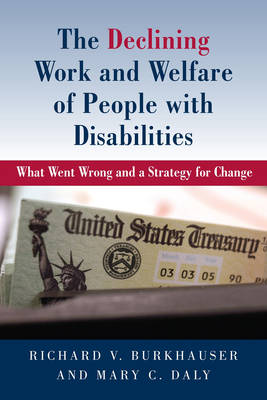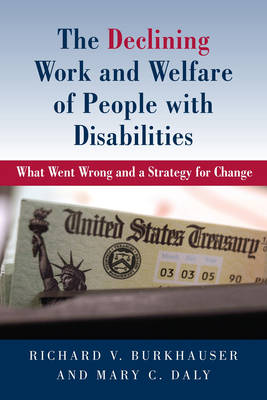
- Afhalen na 1 uur in een winkel met voorraad
- Gratis thuislevering in België vanaf € 30
- Ruim aanbod met 7 miljoen producten
- Afhalen na 1 uur in een winkel met voorraad
- Gratis thuislevering in België vanaf € 30
- Ruim aanbod met 7 miljoen producten
Zoeken
The Declining Work and Welfare of People with Disabilities
What Went Wrong and a Strategy for Change
Richard V Burkhauser, Mary Daly
Hardcover | Engels
€ 62,95
+ 125 punten
Omschrijving
The U.S. disability insurance system is an important part of the federal social safety net; it provides financial protection to working-age Americans who have illnesses, injuries, or conditions that render them unable to work as they did before becoming disabled or that prevent them from adjusting to other work. An examination of the workings of the system, however, raises deep concerns about its financial stability and effectiveness. Disability rolls are rising, household income for the disabled is stagnant, and employment rates among people with disabilities are at an all-time low. Mary Daly and Richard Burkhauser contend that these outcomes are not inevitable; rather, they are reflections of the incentives built into public policies targeted at those with disabilities, namely the SSDI, SSI-disabled adults, and SSI-disabled children benefit programs. The Declining Work and Welfare of People with Disabilities considers how policies could be changed to improve the well-being of people with disabilities and to
Specificaties
Betrokkenen
- Auteur(s):
- Uitgeverij:
Inhoud
- Aantal bladzijden:
- 169
- Taal:
- Engels
Eigenschappen
- Productcode (EAN):
- 9780844772158
- Verschijningsdatum:
- 11/08/2011
- Uitvoering:
- Hardcover
- Formaat:
- Genaaid
- Afmetingen:
- 162 mm x 230 mm
- Gewicht:
- 376 g

Alleen bij Standaard Boekhandel
+ 125 punten op je klantenkaart van Standaard Boekhandel
Beoordelingen
We publiceren alleen reviews die voldoen aan de voorwaarden voor reviews. Bekijk onze voorwaarden voor reviews.











